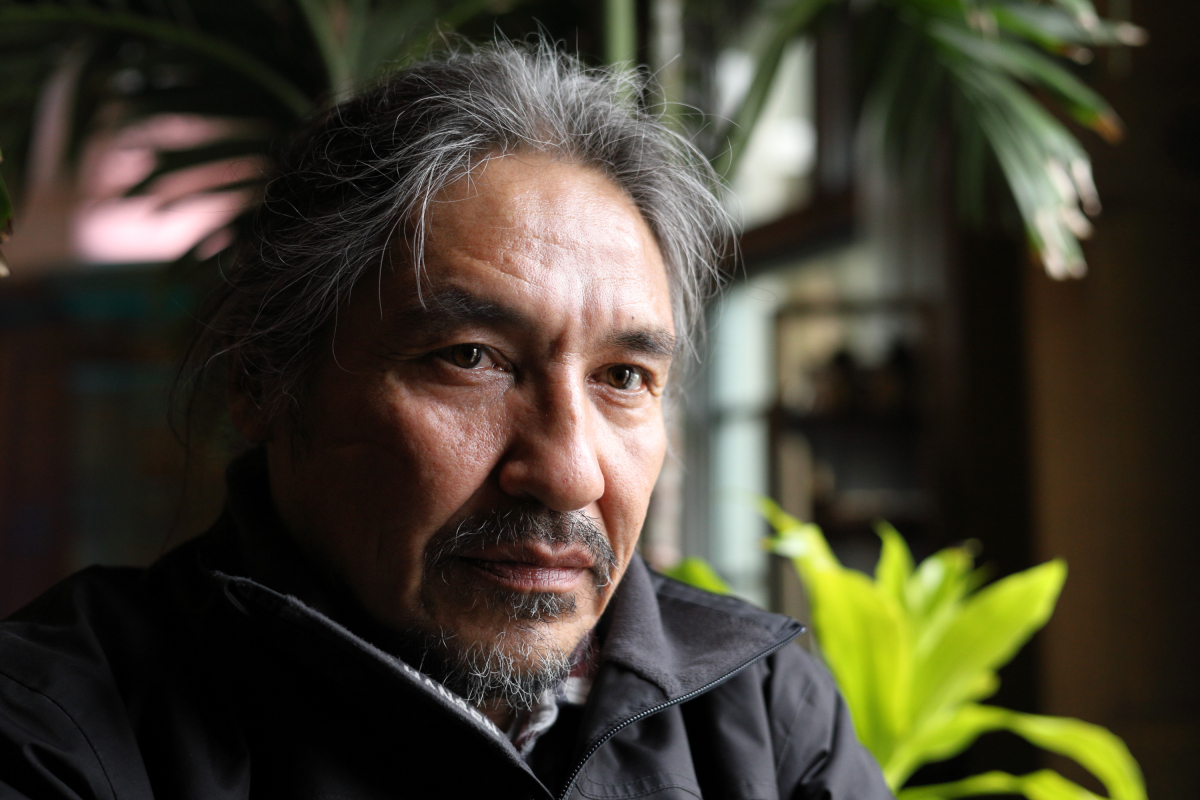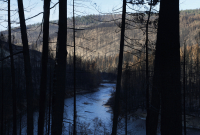Support strong Canadian climate journalism for 2025
Following years of advocacy and struggle, Indigenous nations downstream of the oilsands have received funding to understand the diseases they argue are a direct cause of the fossil fuel industry.
On Wednesday, flanked by Indigenous leaders from the region, Environment Minister Steven Guilbeault announced funding for a community-led study into the health impacts of the oilsands.
There is a sense of payoff and joy within the community’s following years of advocacy at the federal-provincial level to receive the funding for the community-led health study.
Chief Allan Adam, who has become a familiar face in Ottawa over the past years, has himself had family members pass away from rare cancers. He is not alone in Athabasca Chipewyan First Nation (ACFN) with that family history.
For years, ACFN has raised the alarm on rare cancers found in the community. And now, the long-term health study will help the nation establish a health baseline, understand the exact causes of high cancer rates and explore the impact on members' health as they continue to harvest on their traditional territory.
The nation also "expects the results of this [study] to establish concrete policy and mandate changes for how things in our homelands and territory operate," the First Nation told Canada's National Observer in a statement.
Mikisew Cree First Nation, ACFN and the Fort Chipewayan Métis nation will lead the study into the health risks posed to their community members. The announcement arrives on the heels of the announcement of a federal study into naphthenic acids (NAs) that accumulate in oilsands tailing ponds and have been found to harm fish and amphibians. There are still research gaps on how it affects human health.
Other studies have also revealed unsafe levels of arsenic, mercury, and hydrocarbons in the region's water and the territory that the nation lives on and harvests from.
In a virtual news conference, Guilbeault announced that the study will provide $12.5 million over the next decade and map the contaminates from the oilsands. The money will be allocated from Environment and Climate Change Canada, Indigenous Services Canada, and Health Canada. The communities will lead the study and will provide comprehensive data on the health and environmental impacts.
During the press conference, Guilbeault told reporters about the human cost of oilsands operations.
"I've heard stories of health troubles, very high cancer rates, a concern about contaminants in the water, and since the Kearl mine those concerns have been exacerbated,” Guilbeault said.
Eighteen months ago, tailings ponds from the Kearl’s oilsands mine near Fort McMurray, Alta., had been leaking for months. It was eight months before community members were informed about the leak, leading to court challenges against the Alberta Energy Regulator over its failure to regulate the leak.
Reacting to the announcement, Alienor Rougeot, Program Manager for Environmental Defence, told Canada’s National Observer the funding is a “nuanced win” for the nations. Movement from Ottawa is a huge testimony for the advocacy of the nations including ACFN and its Chief Allan Adam, she said. However, funding is arriving “so late in the game,” Rougeot said, pointing to worries that industry and governments may wait for the study to complete before taking more precautionary measures.
What’s next for Danielle Smith’s government?
The Athabasca Chipewyan First Nation has called on the Alberta government to do more to support health research in the community, including providing funding for more research or contributing its own funds in addition to the federal government’s support.
Alberta is “committed to continuing to protect the health of all Albertans and Indigenous communities while also ensuring we keep our waterways and environment safe and protected for generations to come,” Ryan Fournier, Press Secretary to Provincial Environment Minister Rebecca Schulz, said in a statement to Canada’s National Observer.
Fournier explained that the province would be seeking more information on the health study announced by the federal government and signed a memorandum of understanding (MOU) with ACFN to explore a health study.
It’s still unclear what will happen next. Right now, ACFN has taken the province to court to enforce the MOU, as they say the province has not been at the table meaningfully.
"The MOU offered a path forward where all parties (federal, provincial and Indigenous governments) would work together to fund and develop the study collaboratively but as of right now Alberta is failing to honor the agreement that it made with our nation," ACFN told Canada's National Observer in a statement.
For Rougeot, inaction from Alberta reveals “such an element of racism there and of injustice that we have to be calling out,” she said. She said it’s an example of ongoing environmental racism — placing racialized and Indigenous communities in harm’s way.
“Would this be happening to a non-Indigenous community?” she asks.
Reactions from the oil industry
In a statement to Canada’s National Observer, Imperial Oil Ltd spokeswoman Christine Randall reiterated the company’s support and willingness to participate in the health study to “improve understanding and build confidence in our communities regarding our industry.”
Imperial also expressed regrets over the Kearl leaks. However, a company spokesperson said that mitigation measures are working and that monitoring data shows “no indication of adverse impacts to local wildlife or fish populations in nearby river systems and no risks to drinking water for local communities.”
To Rougeot, Imperial's claims are “completely gaslighting the community,” who say they are being impacted by industry operations. The industry's failure to deny the leak itself but that it had any effect on the environment sets a dangerous tone, Rougeot explained.
“It's a constant contrast we're seeing between the words and the actions of these companies,” Rougeot said.
Canada’s National Observer also contacted the Pathways Alliance but did not hear back by publication.
— with files from Natasha Bulowski and Mia Rabson, the Canadian Press
Matteo Cimellaro / Canada’s National Observer / Local Journalism Initiative
This article was updated to reflect comment from Athabasca Chipewyan First Nation.







Comments
What a waste of tax payer's money for something that was so obvious from the get go. The government instead, should have force the industry to pay for the study to prove otherwise and be peer reviewed so they couldn't falsify any data. As a tax payer, the government should send the industry the bill to re-coop the tax payers cost.
Your point is well taken.
But bureaucracy and protocol probably dictate it be approached this way.
Industry would cry foul and fingers would be pointed.
So better late than never.
I just wonder if Danielle Smith's Alberta would like to at least pay 1/2 the cost, take 1/2 the responsibility for the findings, and do 1/2 the work in doing something about it.